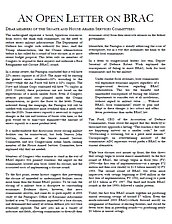The undersigned represent a broad, bipartisan consensus from across the think tank community, on the need to reduce excess military infrastructure. The Department of Defense has sought such authority for years. And the Trump administration, like the Obama administration before it, has called for a round of base closures in its most recent budget proposal. This letter calls on members of Congress to respond to these requests and authorize a Base Realignment and Closure (BRAC) round.
In a recent review, the Pentagon concluded that it will have 22% excess capacity as of 2019. The Army will be carrying the greatest excess overhead — 33% according to the study — while the Air Force will have a 32% surplus. The Navy and Marine Corps combined will have 7% surplus in 2019. Notably, these projections are not based on the expectations of a much smaller force. Even if Congress reverses personnel cuts planned under the Obama administration, or grows the force to the levels Trump indicated during the campaign, the Pentagon will still be saddled with considerably more overhead than it needs well into the 2020s. Some excess capacity is necessary to support changes in the size and location of forces over time, so the goal would be to trim — not eliminate — the amount of excess capacity to a more prudent level.
It is understandable that discussions about closing military facilities can be controversial, but both Senator John McCain, chairman of the Senate Armed Services Committee, and also Congressman Adam Smith, ranking member of the House Armed Services Committee, have explained why they are needed.
Members of Congress who continue to stand in the way of BRAC express two primary concerns: the impact on the communities located near bases slated for closure, and the associated costs of implementing a closure round.
To the first point, recent history suggests that preventing the closure of unneeded or underutilized facilities causes more harm than the formal BRAC process. To be sure, the closing of a military base is disruptive to surrounding economies. Evidence shows, however, that most communities recover, and some do so quite rapidly. A 2005 study by the Pentagon’s Office of Economic Adjustment looked at over 70 communities impacted by a base closure, and determined that nearly all civilian defense jobs lost were eventually replaced. The new jobs are in a variety of industries and fields, allowing communities to diversify their economies away from their excessive reliance on the federal government.
Meanwhile, the Pentagon is already addressing the issue of overcapacity, but in a way that maximizes the harm to the affected local communities.
In a letter to congressional leaders last year, Deputy Secretary of Defense Robert Work explained the consequences of failing to enact BRAC, both for local communities and for the military:
Under current fiscal restraints, local communities will experience economic impacts regardless of a congressional decision regarding BRAC authorization. This has the harmful and unintended consequence of forcing the Military Departments to consider cuts at all installations, without regard to military value. … Without BRAC, local communities’ ability to plan and adapt to these changes is less robust and offers fewer protections than under BRAC law.
Tim Ford, CEO of the Association of Defense Communities, warns about the impact that this death-by-a-thousand-cuts approach is having. “The concern is that cuts are happening anyway on a smaller scale,” he said. “Downsizing is occurring, but in a piece meal manner.” Unsurprisingly, an overwhelming majority of the communities ADC represents would prefer a BRAC to the current alternative.
While base closures cost money up front, the data shows that savings begin to accrue almost immediately. In the first round of BRAC, the savings began in fiscal year (FY) 1990 — the first year of implementation — at a meager $72 million and then rose steadily to $1.5 billion annually by FY 1995. The second round of BRAC was even more impressive, with savings beginning at $548 million in the first year of implementation, FY 1992, and rising to a peak of $3.4 billion in FY 1997. The third and fourth BRAC rounds in the late 1990s followed a similar pattern.
Today, the first four BRAC rounds together are producing annual recurring savings of around $7 billion. Even the much-criticized 2005 BRAC — which focused mostly on realignment of functions at existing facilities, and closed far fewer bases than in preceding rounds — is producing nearly $5 billion in annual savings.
Members of Congress who profess great concern about cutting waste, but who claim that an overseas BRAC must come first, are being disingenuous: the Pentagon retains the ability to close military facilities not on U.S. soil, and has done so, but Congress has blocked closures here at home for over a decade. In that time, the military has been forced to allocate resources away from the training and equipping of our soldiers, and toward maintaining unneeded and unwanted infrastructure. Local communities have been deprived of the support that BRAC would provide, and have been denied access to property that could be put to productive use. Meanwhile, many tens of billions of taxpayers’ dollars have been wasted.
BRAC has proven to be a fair and efficient process for making the difficult but necessary decisions related to the configuration of our military’s infrastructure. In the absence of a BRAC, defense communities are hurting. Although members of Congress have blocked base closures with the intent of helping these communities, they are actually making the problem worse. The time to act is now. Congress should grant our military the authority to eliminate waste, and ensure that vital defense resources flow to where they are most needed.
